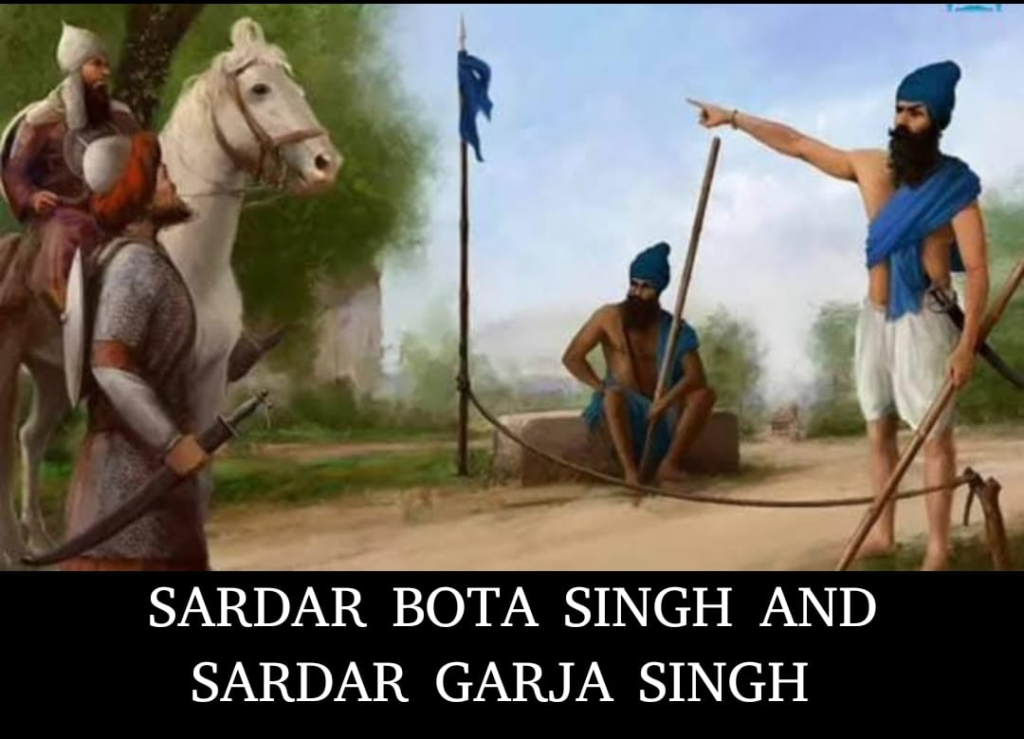Sardar Bota Singh and Garja Singh: Symbols of Indomitable Courage and Valor
During the Mughal Empire, when the atrocities against the Sikh community had reached their peak, the rulers of that time vowed to eradicate the Khalsa Panth. Whenever plunderers like Nadir Shah and Ahmad Shah Abdali returned after looting India, the Sikh warriors would stand in their way, seize the looted goods, and distribute them among the needy. This infuriated the Mughal rulers. The then governor of Punjab, Zakaria Khan, declared a bounty on the heads of Sikhs and propagated that the Sikhs had been wiped out.
In this oppressive period, even the entry of Sikhs into sacred places like Sri Darbar Sahib Amritsar was prohibited. During these challenging times, Baba Bota Singh and Baba Garja Singh, unable to bear the suffering of the Sikh community, resolved to take revenge. The two bravehearts set up a camp near Nooruddin Sarai on a bridge and began their struggle. They established a toll booth and started collecting tolls from the passing travelers.
Declaration of Sikh Valor
From this place, they sent a satirical letter to Zakaria Khan. In the letter, they addressed him as “Bhabi” and declared that the Khalsa Raj had been established. Baba Bota Singh’s words in the letter were as follows:
चिट्ठी लिखे सिंह बोता,
हथ है सोटा, विच राह खड़ोता।
आना लाया गड्डे नूं,
पैसा लाया खोता।
आखे भाबी खानो नूं,
यो आखे सिंह बोता।
Meaning:
In this satirical letter, Baba Bota Singh is mocking the Mughal ruler Zakaria Khan. He addresses him as “Bhabi” (a playful or derogatory term) and boldly states that he (Bota Singh) is standing in the way, ready to confront the oppressors. The line “the traveler brings the cart, and the money it brings is lost” signifies the idea of stopping the looted wealth from reaching its destination, symbolizing resistance to the plunder and exploitation by the Mughal forces. Through this letter, Baba Bota Singh is declaring his defiance and the establishment of Khalsa rule, while ridiculing the Mughal authority.
When this letter reached Zakaria Khan, he was insulted and sent a squad of 200 soldiers to kill these warriors.
Fierce Battle and Martyrdom
The Mughal soldiers surrounded these heroes from all sides. Baba Bota Singh challenged them, saying, “If you have the courage, come one by one and face me!”
The soldiers attacked one by one, but Baba Bota Singh knocked down a dozen soldiers with his staff. Even when two soldiers attacked at once, these warriors overpowered them. Finally, enraged, all the Mughal soldiers attacked together.
In this fierce battle, Baba Bota Singh and Garja Singh displayed incredible bravery, killing over two dozen Mughal soldiers. Ultimately, on July 27, 1739, these two warriors attained martyrdom while defending their motherland.
Source of Inspiration
The courageous actions of Baba Bota Singh and Baba Garja Singh teach us that standing against oppression is the duty of true heroes in every era. Their martyrdom continues to serve as a source of inspiration for the Sikh community, proving that it is better to die fighting injustice and immorality than to bow down before them.

